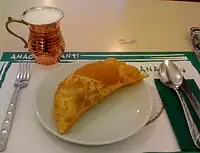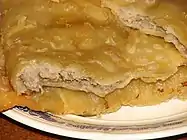 Çibörek and ayran in a Turkish cafe | |
| Alternative names | Çibörek, çiğ börek |
|---|---|
| Course | Main course |
| Region or state | Crimean Peninsula |
| Created by | Crimean Tatars[1] |
| Main ingredients | Lamb or beef |
| 283 kcal (1185 kJ) | |
Chebureki[lower-alpha 1] are deep-fried turnovers with a filling of ground or minced meat and onions.[2] They are made with a single round piece of dough folded over the filling in a crescent shape.[3]
Chebureki is a national dish of Crimean Tatar cuisine.[1] They are popular as a snack and street food throughout the Caucasus, West Asia, Central Asia, Lithuania, Latvia, Estonia, Ukraine, Russia, Eastern Europe,[1][3] as well as in Turkey,[4] Greece and Romania.
Preparation
A cheburek is a half-round-shaped börek, filled with a very thin layer of ground beef or lamb which has been seasoned with ground onion and black pepper.
The dough is made of flour, water (usually of a baker percentage of ~50%), salt, and oil. It is soft and pliable, but not sticky. It is separated into small balls and each is rolled out with a thin rolling pin. Additional flour is added only as needed to prevent the dough from sticking.[5][6]
The meat fill is layered thinly enough that it will cook fully in the sealed half-moon pocket.
Finally, the whole is fried in oil (usually sunflower oil or corn oil) until the dough becomes golden.
Variations
Cheburek is called Çibörek ("çiğ" meaning "raw" and "börek"- pastry in Turkish language). It is very popular, especially in Eskişehir.[4]
 Example of serving Çiğ Börek
Example of serving Çiğ Börek Chebureki, cut open
Chebureki, cut open
See also
- List of stuffed dishes
- Cantiq
- Curry puff
- Empanada
- Fleischkuekle, a Black Sea German variant common to diaspora communities in The Dakotas
- Gözleme
- Haliva, a similar Circassian pastry
- Khuushuur, a similar kind of meat pastry in Mongolian cuisine
- Lángos
- Lörtsy, a similar kind of pastry in Finnish cuisine
- Pastel (food)
- Pasty
- Paste, a Mexican variation of the Cornish pasty
- Peremech
- Plăcintă
- Qutab, an Azerbaijani variant
- Sha phaley, a similar Tibetan pastry
Notes
- ↑ from Crimean Tatar: çiberek; via Russian: чебурек, romanized: cheburek, which is single form; plural one is Russian: чебуреки, romanized: chebureki; see also wikt:чебурек
References
- 1 2 3 Karen Evans-Romaine; Helena Goscilo; Tatiana Smorodinskaya, eds. (2013). Encyclopedia of Contemporary Russian Culture. Taylor & Francis. p. 100. ISBN 978-1-136-78785-0. Retrieved November 5, 2016.
Originally a Crimean Tatar dish, cheburerki became popular in other regions of the former USSR.
- ↑ Bylinka, E.A.L. (2011). Home Cooking from Russia: A Collection of Traditional, Yet Contemporary Recipes. AuthorHouse. p. 12. ISBN 978-1-4670-4136-2. Retrieved November 5, 2016.
- 1 2 Kraig, Bruce; Sen, Colleen Taylor (2013). Street Food Around the World: An Encyclopedia of Food and Culture. ABC-CLIO. p. 369. ISBN 978-1-59884-955-4. Retrieved November 5, 2016.
- 1 2 Kraig, Bruce; Sen, Colleen Taylor (2013). Street Food Around the World: An Encyclopedia of Food and Culture. ABC-CLIO. p. 364. ISBN 978-1-59884-955-4. Retrieved November 5, 2016.
- ↑ Sarlık, Mehmet (2000). 5. Afyonkarahisar Araştırmaları Sempozyumu bildirileri. Afyon Belediyesi. ISBN 978-975-93567-0-5.
- ↑ Sarar, İsmail Ali (1995). Eskişehir: edebiyatı, tarihi, kültürü, folkloru üzerine bildiriler. Çınar Yayıncılık.
